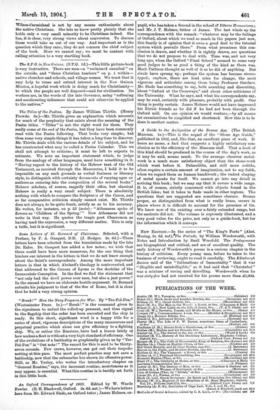pupil, who has taken a Second in the school of
Lit eras Humaniores ; and Mr. J. T. Holmes, father of James. The last winds up the correspondence with the remark: "whatever may be the failings of Oxford, about which we read so much in the papers just now, this family is of opinion that it owes a good deal to the tutorial gstem which prevails there." From what premisses this con- clusion is drawn, and whether it is rightly drawn, are questions that we do not propose to deal with. Time was, and not very long ago, when the Oxford "Final School" seemed to some very good judges to be as good a thing of the kind as there was. Mark Pattison thought as well of it as he did of anything. But rivals have sprung Up; perhaps the system has become stereo- typed ; anyhow, there are loud cries for change, the most vigorous and articulate among them being Professor Gardner. Mr. Slade has something to say, both assenting and dissenting, *about "Oxford at the Crossways," and about other criticisms of the University. What he says, and what his correspondents say, may be read, certainly with pleasure, probably with profit. One thing is pretty certain. James Holmes would not have impressed his Zurich friends as he did if he had not been through tho Oxford mill. On one opinion we would venture,—by all means let examinations be amplified and shortened. How this is to be done is another matter.










































 Previous page
Previous page